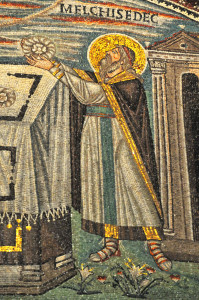After his return from the defeat of Chedorlaomer and the kings who were with him, the king of Sodom went out to meet him at the Valley of Shaveh (that is, the King’s Valley). And King Melchizedek of Salem brought out bread and wine; he was priest of God Most High. He blessed him and said,
‘Blessed be Abram by God Most High,
maker of heaven and earth;
and blessed be God Most High,
who has delivered your enemies into your hand!’
And Abram gave him one-tenth of everything. Then the king of Sodom said to Abram, ‘Give me the people, but take the goods for yourself.’ But Abram said to the king of Sodom, ‘I have sworn to the Lord, God Most High, maker of heaven and earth, that I would not take a thread or a sandal-thong or anything that is yours, so that you might not say, “I have made Abram rich.” I will take nothing but what the young men have eaten, and the share of the men who went with me—Aner, Eshcol, and Mamre. Let them take their share.’
 This is a very dense yet interestingly revealing passage about the nature of God and our relationship to Him. We are still very early in the Old Testament and the covenant has yet to be made with Abraham and the chosen people have yet to come into the Promised Land and Jerusalem has yet to become the Holy City.
This is a very dense yet interestingly revealing passage about the nature of God and our relationship to Him. We are still very early in the Old Testament and the covenant has yet to be made with Abraham and the chosen people have yet to come into the Promised Land and Jerusalem has yet to become the Holy City.
While I have been avoiding cross-referencing passages, we must look at this one though through Hebrews 7:1-3 in hopes of parsing out a translation that will help us glean some insight into this passage from Genesis. My reasoning for allowing cross-referencing on this passage is slowly a language issue, to help us better understand who Melchizedek is, and what importance can be placed upon this High Priest of God.
In Hebrews 7:1-3 the name of this “Melchizedek, King of Salem, which is, King of peace; without father, without mother, without descent, having neither beginning of days, nor end of life.” And from Melchizedek Abram accepts blessing.
The significance of this was that Salem meant and would become Jerusalem, and so Abram is linked already with what is to become the Holy City and the center of his peoples’ lives. But furthermore the High Priest and Priests of this city would later in history adapt themselves to the conquering people that would come into their land, the Israelites, and adapt to their faith.
Interesting that long before Christianity adapted cultural and religious norms in mission countries, the Jewish people would also partake of the same practice. Cultural assimilation and cultural blending goes far back into the recess of time and the bible it seems.
But what does it mean that the chosen people will accept as their priest, priest of the order of Melchizedek instead of Levites, or in conjunction with Levites? For Christians today fighting to maintain traditions exactly that have been handed down to us and creating museums of our churches instead of places of worship this passage can utterly undermine those initiatives.
Long ago, in both our common Jewish and Christian distant past there was cultural adaptation and assimilation of new ideas, new traditions and new forms of worship. For us in the Anglican Church this should be a wake up call that it is okay to do worship without the BCP or the BAS, and that God can be found in Fresh Expression of worship.
In fact, one could say it is scripturally based to try new things in hopes of turning the local area we find ourselves in, our Salem, into a Holy City, a Jerusalem; a city and place where we can come to meet and be with God here on earth.
